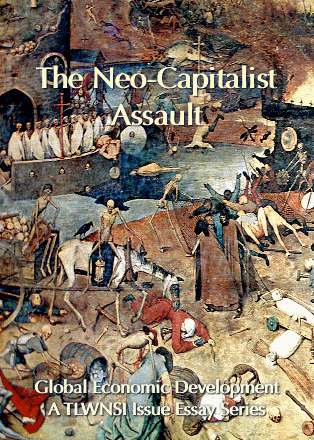 | ||||
 | ||||
by Alvaro J. de Regil TJSGA's staff and guest writers collaborate with essays covering issues that are highly relevant to its missions and principles and that support the arguments used by TLWNSI. The first work is a series of essays that provide an in-depth analysis of the neoliberal process of globalisation, its perils and opportunities. Why have Seattle, Prague, Quebec and Genoa exploded against globalization? What are its implications? In 1998 the world's 225 richest people had a combined wealth of $1 trillion. That is equal to the combined annual income of the world's 2.5 billion poorest people. The combined wealth of the three most well-to-do individuals now exceeds the combined GDP of the 48 least developed countries. In 1996 the UNDP reported that 100 countries were worse off then than 15 years earlier. Three decades ago, the people in the well-to-do countries were 30 times better off than those in countries where the poorest 20% of the world's population live. By 1998, this gap had widened to 82 times. One must suffer from a complete lack of social conscious not to find these comparisons insulting. We should ask ourselves if there is any trace of fairness in a system where 0.00000004% of the world's population has as much wealth as the poorest 42% of the world's population. So why is this occurring, and what is society doing about it? Like The Crisis of Global Capitalism of George Soros or The Post-Corporate World of David C. Korten, The Neo-Capitalist Assault denounces the tremendous injustices of global neoliberal Capitalism and the empowerment of corporations to impose market Democracy upon the civil societies of the world. But, unlike these works, it proposes solutions conceived to benefit both developed and developing nations. This series was prepared between 1999 and 2001. Use the menu above to review and download each essay.
|
- © The Jus Semper Global Alliance
| Home |  | Resources |  | Economic Data |  | The Neo-Capitalist Assault |


